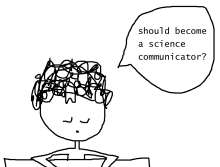Many people email me who want a career in science communication. This is awesome. I can’t write a super long response to each so I am compiling all my science communication career advice here. I cover education, program recommendations, science communication jobs, getting your foot in the door, career changes and excelling once you bagged the job.
Education.
You don’t have to have a degree in science communication. Some people have a degree in science-related fields and then convert into communication. It is helpful to have a background (either a degree or work experience) in communication, journalism or science. You must have either some training (internships or on-the-job) or education in communication and outreach because this is a skill, not something you can just intuitively do . If you do want to get a degree, then look into communication or journalism programs. There aren’t really “science communication” departments. There are communication departments and journalism departments. Some offer a focus on science communication, but most don’t. That’s fine. A good communication or journalism program will give you a strong footing. Just choose your courses and research wisely so that it is in-line with your ultimate goals.
Program recommendations.
I have none. Make the best of where you go. For your undergraduate degree, try to avoid taking out a lot of debt. For graduate school, go where they offer you funding.
Science communication jobs.
You don’t really see the job title “Science Communicator” pop up. Maybe this will change in the future. But today, science communication is more like the activity you engage in under a more conventional job title. Some of these job titles could be: science writer, communication associate, social media coordinator, outreach manager, etc. I did the most engaging and wonderful science communication under the job title of “Director of Communications.” To get a job in science communication, you need to find an organization or institution that engages in science and research. These can be: universities, non-profits, research centers, governmental agencies, select companies, etc. Then look at the departments or initiatives within that organization. Good keywords to look for are: outreach, engagement, communication, public relations, media, liaison, etc.
You just graduated and want a job.
Getting started in any field is full of challenges. It seems like employers expect everyone to have 2 – 5 years work experience, even if you just graduated. That said, we over-do it on advising students to have internships. A couple internships are good, but any more than 5 and you haven’t been paying enough attention to your schoolwork. An internship is a helpful way to gain some experience. However, there are many other ways. Clubs. Student newspapers. Creating your own website where you write up stories on cool, local science news. Also, keep in mind that you rarely get your ideal job right out of school. It is a process. You need to start building up tools to make yourself capable for the role of a science communicator. Your first job might not be (probably won’t be) science communication, so try to find something that can make you attractive for that role little by little. These are jobs that have transferrable skillsets. Social media. Public interfacing. Strategy. Communications. Organization. Creativity. Writing.
Career change.
Awesome. It’s cool to change careers. You don’t have to start from zero. Look at what you’ve done, and write down everything that contributes to you being a good science communicator. Nearly every job you could possible have had will have some skillset, no matter how tiny, that you could use to sell yourself as a science communicator. Was your last job scientifically technical? Great! You can understand complex concepts. Was your last job programming? Nice! You can design cool webpages (hopefully you have a grasp on HTML, that is). But you’re also going to have to go out and meet people. Lots and lots of informational interviews or externships. A TIP: When you email someone who works in science communication, don’t just say, “I want to chat.” I have no idea how to respond to people who email me this. But if you DO have a specific question, or a list of specific questions, that’s awesome! A SECOND TIP: Don’t ask anyone out to coffee and then just talk about yourself. Come with a prepared list of topics and run through them.
You bagged the job and you want to excel.
Innovate. Innovate. Innovate. The best science communicators are the most innovative. And the most creative, upbeat and hard-working. You can’t do it how it was done before. There’s no template, because science is always evolving, and SO IS THE WAY WE COMMUNICATE. Every bit of science that needs to be communicated is unique, and so will the way you communicate it, which can also vary from audience to audience. Be bold and courageous. You’re also going to have to be persuasive. So do your homework and make sure you can justify your project choices. You’ll have to persuade your colleagues that the project is worth it, and you’ll have to persuade the scientists to talk to you and explain things to you. Consider yourself forewarned: good science communication requires stick-to-itiveness, the willingness to work with people who are busy and don’t always get what you’re doing and the courage to create unique projects that break the mold. But that’s also what makes being a science communicator so awesome!

Thanks Jessie, this was helpful.
LikeLike
A million thanks, Jessie. Your wise counsel has been topnotch.
LikeLike
Well, I am a budding ‘science writer’ in Nigeria. And if it were possible to get your email address, I would love to learn more and hopefully find answers for my questions and concerns. Thanks!
LikeLike